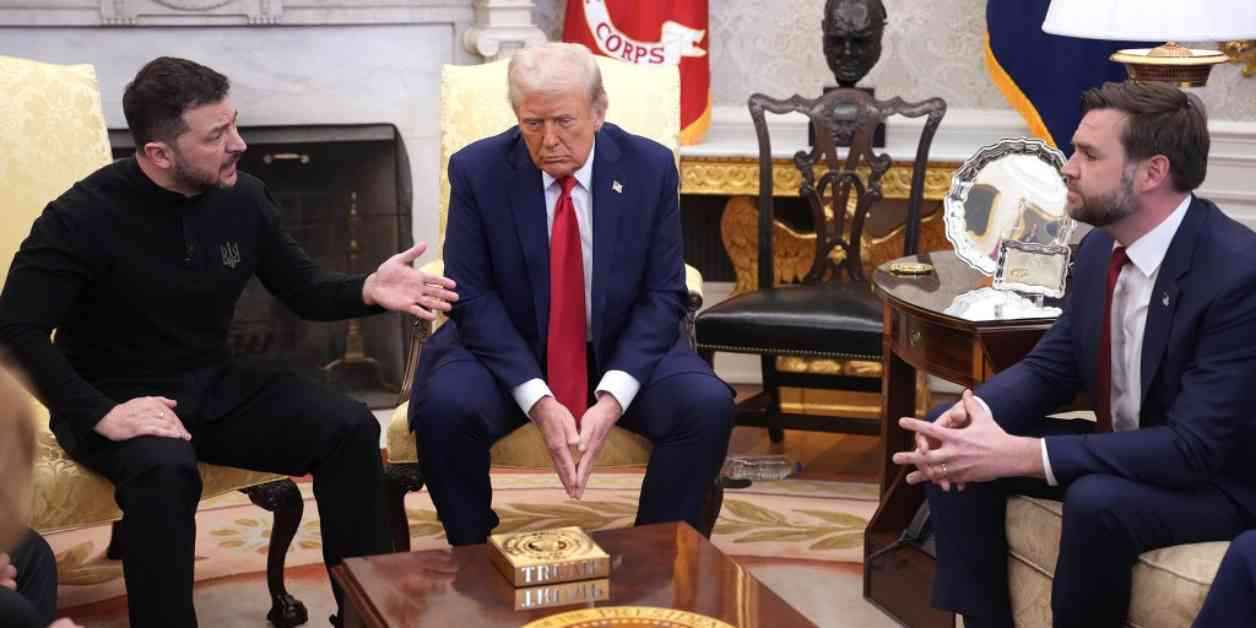In a shocking turn of events at the Oval Office, Vice President JD Vance found himself embroiled in a heated exchange with Ukrainian President Volodymyr Zelenskyy. The encounter, which unfolded after a press briefing with President Donald Trump, quickly escalated into a full-blown argument that captivated onlookers both in the room and around the world.
The tension began when Vance, seizing the opportunity to address a question about Trump’s foreign policy approach, commended the president’s handling of the conflict in Ukraine. Zelenskyy, however, took offense at Vance’s remarks, leading to a fiery back-and-forth between the two leaders that lasted for a grueling seven minutes.
Accusations flew as Vance accused Zelenskyy of disrespect, ingratitude for American assistance, and engaging in what he termed a “propaganda tour.” Zelenskyy, in turn, questioned Vance’s authority on Ukrainian matters, prompting a defensive response from the Vice President.
The situation took a dramatic turn when Trump himself jumped into the fray, urging Zelenskyy to show more appreciation and warning of the potential consequences of his actions. The exchange left many observers stunned, with some describing it as a setback for diplomatic efforts.
A Display of Assertiveness in Foreign Policy
The altercation with Zelenskyy was just the latest in a series of bold moves by Vance on the international stage. Known for his outspoken views on foreign aid to Ukraine, Vance has wasted no time in asserting his influence as Vice President.
At the Munich Security Conference, Vance made waves with a speech that challenged conventional wisdom on global affairs. His remarks drew sharp reactions from world leaders and set the stage for his subsequent encounters with Zelenskyy and British Prime Minister Keir Starmer.
Vance’s unapologetic approach to diplomacy has garnered both praise and criticism, with supporters applauding his willingness to speak his mind and detractors questioning his diplomatic finesse. The Vice President’s actions have underscored his commitment to advancing America’s interests on the world stage.
Reflections on a Contentious Meeting
As the dust settled on the Oval Office showdown, reactions poured in from political figures and analysts alike. Sen. Sheldon Whitehouse characterized the encounter as a departure from the bipartisan spirit of earlier discussions, while Sen. Lindsey Graham labeled it a “disaster.”
Critics of Zelenskyy’s confrontational style pointed to his refusal to engage in constructive dialogue, while supporters of Vance commended his steadfast defense of American interests. The clash of personalities highlighted the delicate balance between personal dynamics and policy objectives in international relations.
The repercussions of the meeting reverberated far and wide, with observers left to ponder the implications for future diplomatic efforts. The high-stakes nature of the exchange underscored the challenges of navigating complex geopolitical terrain and the enduring importance of effective communication in conflict resolution.
As the world watched the drama unfold in the Oval Office, one thing became clear: the interplay of personalities, politics, and power can shape the course of history in unexpected ways. The lasting impact of the Vance-Zelenskyy confrontation remains to be seen, but its significance as a defining moment in contemporary foreign policy is undeniable.


